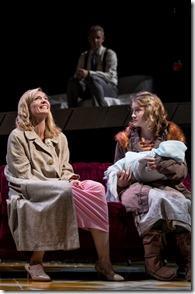
Smokefall
Written by Noah Haidle
Directed by Anne Kauffman
at Goodman Theatre, 170 N. Dearborn (map)
thru Nov 3 | tickets: $10-$40 | more info
Check for half-price tickets
Read review
Despite talented cast and imaginative set, Smokefall falls flat
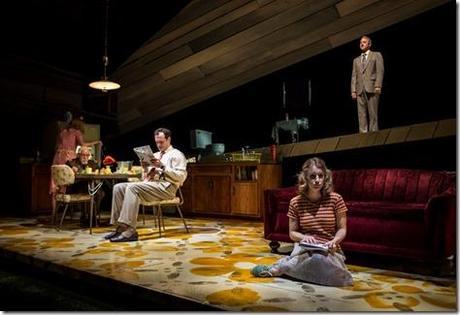
Goodman Theatre presents
Smokefall
Review by Clint May
A while back at a Binny’s, an overhelpful sommelier described a wine as having notes of “flat cola.” Seemed like a such a strange term at the time (I was really more interested in getting something under 10 bucks), but now I find myself in need of it to describe Noah Haidle’s Smokefall. There’s a vague memory of effervescence here and there and at the same time the potential for fizz and pop, but all that’s in the glass is saccharine sugar water. Whatever chances it had to titillate the senses have been subverted by an overbearing sense of meta-awareness that attempts to be sweetly endearing but becomes merely cloying. That’s a big disappointment with such a talented gathering of actors who are relegated to performing in something that—if it weren’t for all the unnecessary F-bombs—would feel like a production written by Wes Anderson and geared towards the young adult crowd.
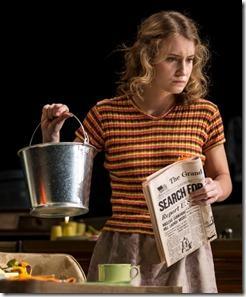
One thing I’ve never seen is vaudeville in utero, and now I can scratch that off my list. Scene two opens with the twins (Guy Massey and Eric Slater) having a remarkably erudite discussion about their situation as their mother’s contractions begin to shake the home around them. Fetus One is deathly concerned about Original Sin’s taint, while Fetus Two tries desperately to cajole him into believing that the time between the silences of unbirth and death are still uniquely worth living. They mention a love of Dostoevsky and Tolstoy (“Happy families are all alike; every unhappy family is unhappy in its own way.”) while simultaneously behaving more or less like Abbott and Costello. Some of this has aspirations of a Mark Twainian short story with its existential device of two new lives pondering if it’s worth it to be born into such an unhappy world. Or maybe it’s a reverse Our Town being told from the point of view of new life instead of recent death. Too bad it’s undercut by the broader sophomore humor Haidle feels necessary to interject as the unborns comment that nothing can be original in a world where some 54 billion have come before. That’s not an excuse to give up trying, says the more adventurous fetus (advice this production could use—commenting on the impossibility of originality is not an excuse to give up trying).
Several decades later, Johnny (Mike Nussbaum)—one of the twins—still lives in the ancestral home. His birthday has brought his son Daniel (Eric Slater) to the dilapidated home where Violet’s apple tree (more allusions to Original Sin) stands in as the Tree of the Knowledge of Love and Suffering. Branches drift down through the collapsed roof, offering fruit to Johnny as he pokes about in his sunset loneliness. Little does he know that today will be an auspicious day when Beauty reveals she has one more magically macabre gift to give.
Whimsical as all this pretends, with its desire to affirm the necessity of living and finding small joys, Smokefall is ultimately undone by its unwillingness to commit. Perhaps not trusting the actors or audience, the nearly 30 “footnotes” do the heavy lifting of pontificating, foreshadowing, revealing plot and giving internal insight in a manner that becomes irritating in those opening and closing scenes (echoing Thorton’s narrator). Show, don’t tell, and stop delighting in the ‘cleverness’ you punctuate like a rimshot following a groaner. In one telling moment, Johnny’s philosophical ramblings are chided by a birthday card from his first and only love as being “undergraduate” and self-serving, effectively critiquing the show itself in a display of ironic detachment. Even the babies provide handy character crib notes on their family just to make sure we ‘get’ it (and to assure us that Haidle ‘gets’ his own clichés too). So many winks and nods are ultimately wearying and pull us out of the emotional space necessary to connect to more heart tugging scenes such as Violet’s first date or one of the twin’s final commentary on the utility of life. If you’re going to go for banal platitudes ("The greatest act of courage is to love."), at least go all out.
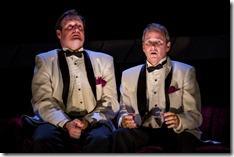 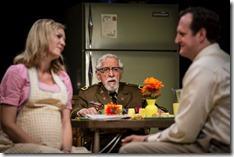
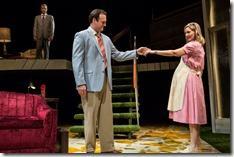 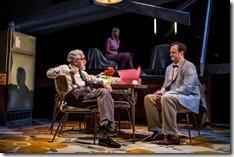 |
Everyone tries gamely to carbonate the affair, and the always delightful Nussbaum can make anything sound profound (how great was he in Freud’s Last Session?) or deliciously acerbic. He can milk laughs from a stone cow. Keberlein is genuinely affecting, and must be included as the other Our Town corollary. Her Violet is Emily’s dark reflection, wondering not if anyone ever understands how wonderful life is, but how anyone has the courage to face it – and would they, if they knew what was to come. Combs mostly just has to be silent in the first act and channel a direct impersonation of Amy Farrah Fowler in the second. Slater and Massey are a charming duo in the womb, though I never quite bought their father and son. Kevin Depinet’s set design is a functional marvel and quite possibly one of the best I’ve seen this year.
Smokefall is so earnest, so willing to try and please everyone and see all points of view, that it ultimately can only sporadically please anyone true to that old Aesop chestnut. Every attempt at profundity becomes so baldly represented that it becomes borderline condescending. Trust us, the audience, to pick up the themes without all these dramatic conceits. Such as it is, Smokefall is destined to be a footnote.
Rating: ★½
Smokefall continues through November 3rd at Goodman’s Owen Theatre, 170 N. Dearborn (map), with performances Wednesdays-Thursdays at 7:30pm, Fridays 8pm, Saturdays 2pm/8pm, Sundays 2pm/7:30pm. Tickets are $10-$40, and are available by phone (312-443-3800) or online through their website (check for half-price tickets at Goldstar.com). More information at GoodmanTheatre.org. (Running time: 2 hours, includes an intermission)
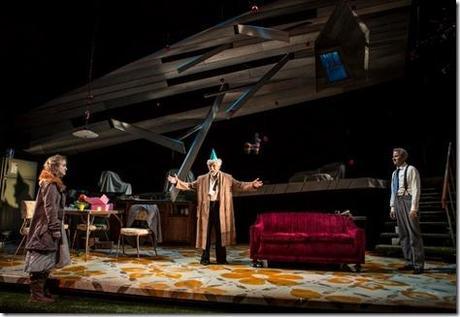
Photos by Liz Lauren
artists
cast
Catherine Combs (Beauty and Blessing), Ann Fogarty (Voice of Lenore), Katherine Keberlein (Violet), Guy Massey (Footnote and Fetus Two), Mike Nussbaum (Colonel), Eric Slater (Daniel and Fetus One)
behind the scenes
Ann Kauffman (director), Kevin Depinet (set design), Ana Kuzmanic (costume design), David Weiner (lighting design), Lindsay Jones (sound design), Kimberly Osgood (stage manager), Liz Lauren (photos)
13-1030

